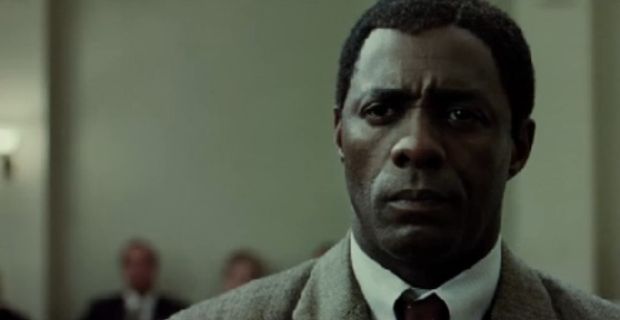
Film: Mandela: Long Walk to Freedom
Director: Justin Chadwick
Writer: William Nicholson
Stars: Idris Elba, Naomie Harris
There are basically only two types of biopics. They either attempt to tell a person’s entire life story over the course of a runtime often approaching 3 hours, or focus on one small but pivotal period in its subject’s life as in Lincoln or The King’s Speech. I generally prefer the latter approach as I tend to favor depth over breadth.
Some people are indeed interesting enough to warrant both treatments, but I wondered if it was too soon for another Nelson Mandela project after the mostly forgettable Invictus and the completely forgotten Winnie Mandela. But if nothing else, the film promised a starring vehicle for an actor who badly deserved one. And Idris Elba comes through with a performance so captivating we’re almost blind to the film’s shortcomings. Almost.
The film clocks in at 152 minutes. I won’t complain about the length, as Mandela’s story is indeed a massive one. I will take issue with the way that time was allocated. The film is unevenly shaded toward Mandela’s nearly three decades spent in prison and subsequent rise to the South African Presidency in the 1990s after the first 30 minutes of the film steamroll through Mandela’s early years as a suave lawyer defending an accused panty-thief, turned peaceful protestor, turned alleged terrorist.
To gloss over these years is to rob the viewer of a chance to see what made Mandela tick. It also abbreviates some of the film’s most electric moments, with the athletic and charismatic Elba at his best in these early scenes as he goes off the grid and spearheads a number of political bombings, bedding more than a few ladies along the way.
Perhaps the filmmakers were afraid of painting Mandela as too much of a gangster, but exploring these years more thoroughly would have done a lot for the film’s cause.
We eventually meet Winnie (Skyfall‘s Naomie Harris) and it isn’t long before Mandela gets cuffed for his violent political statements. In an act of martyrdom, he pleads guilty to the charges and is sentenced to life in prison. Some of the better scenes that follow, much like the father/son relationship in Lee Daniels’ The Butler, depict the way differing political stances can wedge a family apart as Winnie refuses to back down from the conflict.
Some questions I generally ask myself after seeing a biopic are as follows: How well do I feel like I know this person? What were their motivations? The film seems to suggest that Mandela was just born a martyr, which can’t possibly be the case. I came away from Mandela feeling like I had a better understanding of the South African political climate and the tensions that led to the long, slow death of the apartheid, even if I don’t feel like I learned much as it pertains to Mandela the man.
Though quickly becoming a familiar face, particularly to fans of geek cinema thanks to the likes of Pacific Rim and Thor, Elba has not yet been exposed to the point that he loses the ability to disappear into a role like this. Even if he doesn’t look much like the man he’s portraying, he creates a character, rather than a caricature. We aren’t distracted by a huge star’s familiar cadence sneaking through his South African accent.
After 27 years of imprisonment, the youths of South Africa, many of whom weren’t even alive for Mandela’s trial, were still clamoring for Mandela’s freedom. How was his legend kept alive for all these years? Why did he mean so much to these people? And why glorify him over any of his five cohorts who were given the same sentence?
The film is as ham-fisted as they come and leaves us to ponder these questions while instead focusing on slow-motion shots of dead children in the wake of any number of bouts of street violence. And it’s simply too much to ask director Justin Chadwick (The Other Boleyn Girl) to resist at least one U2-fueled montage, even if “Pride (In the Name of Love)” was actually written about Martin Luther King and wasn’t released until 2 years after the year depicted in said montage.
If you thought The Butler was about as safe and conventional as a biopic could get, Mandela is here to prove you wrong. But if you’re the type of person who judges movies for the number of times it sends chills down your spine as you shamelessly fall for slow-motion staircase ascensions accompanied by a schmaltzy musical crescendo, you’re going to walk away from Mandela feeling inspired. Personally, I fell for these tricks on more than one occasion. But I also came away from the film with far too many questions to feel truly satisfied and it’s hard not to wonder what a more daring director could have accomplished with so much juicy material to work with.
Or maybe I’m just missing the point and the film is actually supposed to serve as an extended trailer for Mandela’s biography on which the script was based.
Grade: C+
Review written by: Kevin Blumeyer
- Ceremony Announce New Album, Debut Somber New Tracks - March 27, 2015
- Muse Get “Psycho” on New Track From ‘Drones’ - March 12, 2015
- Tame Impala Release New Single “Let It Happen,” Announce Massive U.S. Tour - March 11, 2015
